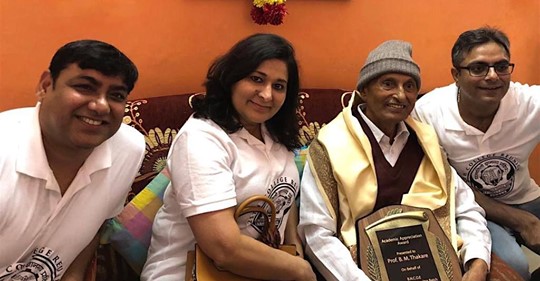
by blogadmin | Aug 15, 2019 | 88to92 Engineering Batch, Blog Post, India, Media Publishing's, Year 2019
An event that took place in 1989 remains etched in my memory. It isn’t the first liver transplant or Sachin Tendulkar’s international debut. No, it’s also not about the fall of the Berlin Wall.
It is about an evening during my computer science undergrad second year at the BN College of Engineering, Pusad, and the college’s then Principal BM Thakare — popularly known as ‘Takla’ among the students.
Rain had engulfed the town and lightning was ripping apart the skies, when Gurminder, Chauhan, and I finally left the Mungsaji Bar — past its closing time. We walked towards the parked cycle-rickshaws outside and enquired: “Eh bhau, engineering college hostel?”
We broke into riotous laughter along the way in the rickshaw, while imitating Nana Patekar’s dialogues from Parinda — a film we had watched earlier that evening. Upon our insistence, bhau removed the rickshaw’s hood from over our heads.
The Terror That Was Principal Thakare
I don’t remember why and when we shifted gears and started to sing. But I remember us loudly singing Shalimaar’s song Hum Bewafa, when we approached the house of Principal Thakare, unaware of our surroundings until my more-academically inclined companions noticed it when the house came into sight, and panicked. The house stood alone, away from the road, between the bar and the hostels.
Their panic only made my Jinga Lala Hur Hur howling louder. Just then two long bursts of lightning illuminated a car backing out of the house. Seeing that even I panicked.
Our worst fears came true. The car screeched to a halt before the rickshaw and the principal jumped out of it. We almost stopped breathing and reluctantly got off the rickshaw, scared out of our wits.
“What’s wrong with you hooligans? Why are you all braying like donkeys in the middle of the night?” This wasn’t the thunder from the sky. We exchanged looks amongst ourselves with furrowed brows.
“We? No, no, sir…we…we were just discussing if Gurminder and Chauhan will get a scholarship for jointly topping the first year,” I said.
“Who was making a lot of noise on the road then?”
“Couple of other rickshaws go…” Gurminder fumbled with words.
“Four college boys… on a bike, sir,” Chauhan said, pointing towards the hostels.
“Many seniors just went past us, sir,” I chimed in. We started to breathe again when Principal Thakare got back into his car. That’s the kind of terror Mr Thakare elicited from both students and staff.
A Lesson In Humility From Principal Thakare
He was the principal of the college from its inception in 1983 until 1996, and then stayed on as director for the next ten years, before moving to Nagpur for good. The rickshaw caper was not the only incident that showed Mr Thakare’s authority and persona.
Sandeep Chahal from Rohtak had just joined the college’s civil engineering course in 1990. A few months later, he and his friends were caught by the hostel warden drinking, dancing and peeing on the hostel roof. They were all summoned to Mr Thakare’s house the next day. It was a Sunday.
“He scolded us, shouted at us, and asked, ‘Should I rusticate you all or give you a chance?”
Sandeep quotes Mr Thakare often when he addresses the student community of the college he runs in his hometown now.
“Principal Thakare kept pacing back and forth in the verandah of his house like a pendulum while we stood below looking bloodless. No one was breathing. After a gap of every two oscillations, he would reach the switchboard and press a button, first on and then off. I stood there reminiscing Sholay’s Gabbar Singh, but singing Maar Diya Jaye Ki Chhod Diya Jaye Bol Tere Saath Kya Slook Kiya Jaye in my head,” Sandeep recalls.
One of Sandeep’s accomplices was Anil Rathee. He was a rebel, in love with trouble. His experience with Mr Thakare was a bit different.
“When I joined the college back after one-year rustication, I was determined to prove Mr Thakare’s saying, ‘you will never pass,’ wrong,” said Rathee. “After graduation I went to meet him.”
“Do you know why I had rusticated you?” Mr Thakare asked him.
“Because of what I did.”
“No, to teach you how important it is to be humble. Life humbles everyone.”
Principal Thakare, The Disciplinarian
Sometimes Mr Thakare’s lessons were a bit more forceful, as Sanjay Grover found out. Sanjay was a year junior to me in the college. He was academically better than his circle of friends. Initially, he used to help them cheat. One day, while walking towards the canteen, he made an about-turn upon seeing the principal heading in his direction.
“Mr Grover,” Mr Thakare called out.
“Yes sir,” Sanjay meekly answered.
“Change your friends and habits,” he said calmly, “and stop doing what you are doing.”
“I don’t understand, sir,” Sanjay replied, applying the ignorance is bliss theorem to the problem at hand.
“Let me be clear, Mr Grover. You are on oxygen and guess who controls the supply? Before Sanjay could answer, Mr Thakare said, “ME!”

How BM Thakare Built An Institution & A Community
As former students recalled their “teaching moments” with Mr Thakare, the faculty remember his commitment to the college. Mr KR Atal taught us mathematics in the first two years. He described how the college evolved from just a badminton hall to what it is today because of Mr Thakare’s vision and work ethic.
“Even in only the badminton hall days, the college’s functioning was smooth,” he said. Later, all classes, labs, library and offices were moved to the current workshop building once it stood up. Mr Thakare was the first one, every day, to reach the college on his scooter. He would greet and welcome students and staff when they entered. All this when he was often the last one to leave.”
His dedication inspired countless former students, even long after graduating, to become Principal Thakare’s ardent followers.
Thousands in India and hundreds spread across the globe felt obliged to visit him in Nagpur whenever possible, and took pride in posting their pictures with him on social media.
Principal Thakare was overwhelmed by the respect and gratitude, as the tears in his eyes often revealed.
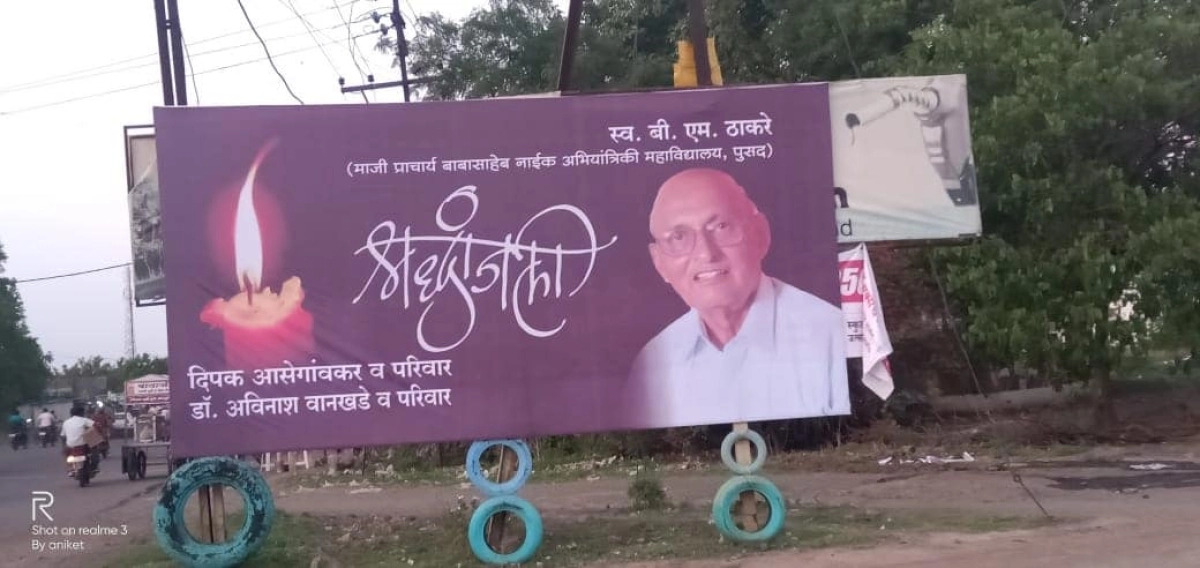
The Devolution Of BM Thakare’s Grand Institution
His ability to build an institution extended to the community. Besides overseeing the affairs of the institution and teaching final year civil engineering students, I cannot understand how he still managed to regularly appear everywhere: from the hostels, the mess halls and college canteen, to private houses rented outside by the students.
The college was booming in those years and he loved steering its growth. Each year saw new additions. From hostels to classes to tennis courts and an administrative block, library, and auditorium — all grew under his direction and supervision.
The college of the time was a multicultural, multilingual and multicoloured garden in full bloom.
No wonder the remote and impoverished Pusad taluka was benefiting from it in more ways than one.
Responding to the growing demand, many new shops, lodges, restaurants, and bars opened up in Pusad. A beautiful garden park also was added between sootgirni and the college. I was still in the college when the local MLA, Sudhakar Rao Naik, became the state’s chief minister in 1991.
I visited the college briefly in 2013 and found that everything had changed. Though the whole college had gathered at the state-of-the-art auditorium to greet me, barely half the room’s capacity was filled. I couldn’t oblige the students when they asked me to speak only in Marathi — not Hindi or English.
Principal Thakare’s Demise: ‘Losing A Mentor, Teacher… My Pappa Ji’
The college looked like India’s concrete jungle metropolis, sans traffic. The empty hostels and near-empty classrooms were sulking—not so silently. Contrast it with my time, when three of us were packed in each hostel room designed for only one.
Pusad, too, had nothing uplifting to offer. A lot of bars, restaurants and other outlets I frequented in my time had died. Sootgirni had closed. The Naik family’s influence, the town’s crowning glory, was rapidly evaporating.
Last year, in Vancouver, I organised an alumni reunion of college students. Someone whispered that the college would soon close because it was struggling with admissions.
I am sure principal BM Thakare knew the state of his “child” only too well. How could he stay to sift through its ashes?
He passed away in the wee hours of 14 July this year.
Thousands of his former students’ messages like this one from the current principal, Avinash M Wankhade, on Facebook, reflect what they felt: “Today I am speechless…feeling alone…I lost my best teacher…I lost my mentor…I lost my PAPPAJI.”
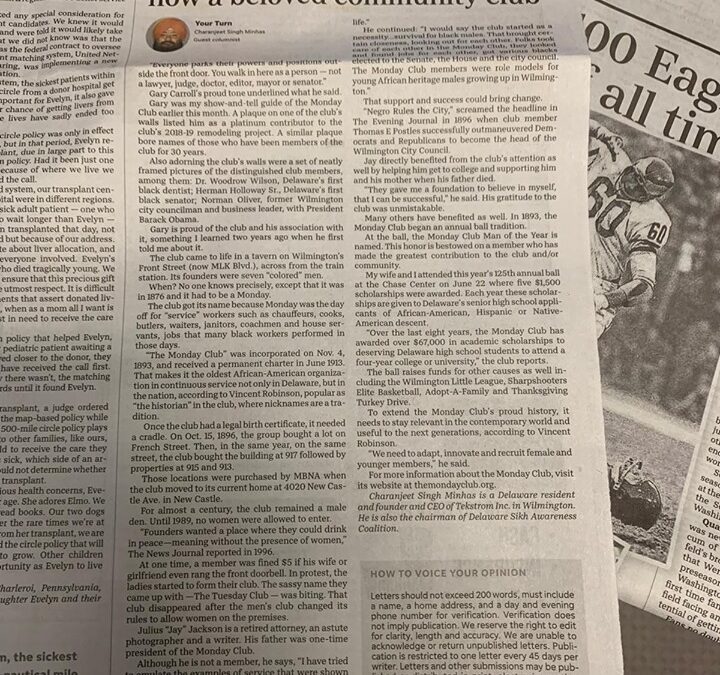
by blogadmin | Aug 12, 2019 | Blog Post, Delaware, Media Publishing's, Year 2019
“Everyone parks their powers and positions outside the front door. You walk in here as a person — not a lawyer, judge, doctor, editor, mayor or senator.”
Gary Carroll’s proud tone underlined what he said.
Gary was my show-and-tell guide of the Monday Club earlier this month. A plaque on one of the club’s walls listed him as a platinum contributor to the club’s 2018-19 remodeling project. A similar plaque bore names of those who have been members of the club for 30 years.
Also adorning the club’s walls were a set of neatly framed pictures of the distinguished club members, among them: Dr. Woodrow Wilson, Delaware’s first black dentist; Herman Holloway Sr., Delaware’s first black senator; Norman Oliver, former Wilmington city councilman and business leader, with President Barack Obama.
Gary is proud of the club and his association with it, something I learned two years ago when he first told me about it.
The club came to life in a tavern on Wilmington’s Front Street (now MLK Blvd.), across from the train station. Its founders were seven “colored” men.
When? No one knows precisely, except that it was in 1876 and it had to be a Monday.
The club got its name because Monday was the day off for “service” workers such as chauffeurs, cooks, butlers, waiters, janitors, coachmen and house servants, jobs that many black workers performed in those days.
“The Monday Club” was incorporated on Nov. 4, 1893, and received a permanent charter in June 1913. That makes it the oldest African-American organization in continuous service not only in Delaware, but in the nation, according to Vincent Robinson, popular as “the historian” in the club, where nicknames are a tradition.
Baltimore’s Arch Social Club earlier claimed the “most antique” tag until Vincent called them one day.
“Upon seeing the web page, I contacted the club and informed them of the Monday Club, Inc., and that their date of incorporation was 19 years later,” he said.
The Arch Social Club reacted to the news gracefully, Vincent said. A few weeks later it sent the Delaware club an invitation to visit, and eight members of The Monday Club drove to Baltimore for the fellowship opportunity.
Once the club had a legal birth certificate, it needed a cradle. On Oct. 15, 1896, the group bought a lot on French Street. Then, in the same year, on the same street, the club bought the building at 917 followed by properties at 915 and 913.
Those locations were purchased by MBNA when the club moved to its current home at 4020 New Castle Ave. in New Castle.
For almost a century, the club remained a male den. Until 1989, no women were allowed to enter.
“Founders wanted a place where they could drink in peace—meaning without the presence of women,” The News Journal reported in 1996.
At one time, a member was fined $5 if his wife or girlfriend even rang the front doorbell. In protest, the ladies started to form their club. The sassy name they came up with —The Tuesday Club — was biting. That club disappeared after the men’s club changed its rules to allow women on the premises.
Although women today remain frequent attendees, and even employees, there still are no females among the Monday Club’s 125 members.
Julius “Jay” Jackson is a retired attorney, an astute photographer and a writer. His father was one-time president of the Monday Club.
Although he is not a member, he says, “I have tried to emulate the examples of service that were shown to me by my father and other members of the club. I learned from an early age that I have an obligation to serve the community and make life better for others. I have tried to do this in my professional and personal life.”
He continued: “I would say the club started as a necessity…survival for black males. That brought certain closeness, looking out for each other. Folks took care of each other in the Monday Club, they looked and found jobs for each other, got various blacks elected to the Senate, the House and the city council. The Monday Club members were role models for young African heritage males growing up in Wilmington.”
That support and success could bring change.
“Negro Rules the City,” screamed the headline in The Evening Journal in 1896 when club member Thomas E Postles successfully outmaneuvered Democrats and Republicans to become the head of the Wilmington City Council.
Jay directly benefited from the club’s attention as well by helping him get to college and supporting him and his mother when his father died.
“They gave me a foundation to believe in myself, that I can be successful,” he said. His gratitude to the club was unmistakable.
Many others have benefited as well. In 1893, the Monday Club began an annual ball tradition.
At the ball, the Monday Club Man of the Year is named. This honor is bestowed on a member who has made the greatest contribution to the club and/or community.
My wife and I attended this year’s 125th annual ball at the Chase Center on June 22 where five $1,500 scholarships were awarded. Each year these scholarships are given to Delaware’s senior high school applicants of African-American, Hispanic or Native-American descent.
“Over the last eight years, the Monday Club has awarded over $67,000 in academic scholarships to deserving Delaware high school students to attend a four-year college or university,” the club reports.
The ball raises funds for other causes as well including the Wilmington Little League, Sharpshooters Elite Basketball, Adopt-A-Family and Thanksgiving Turkey Drive.
To extend the Monday Club’s proud history, it needs to stay relevant in the contemporary world and useful to the next generations, according to Vincent Robinson.
“We need to adapt, innovate and recruit female and younger members,” he said.
For more information about the Monday Club, visit its website at themondayclub.org.
– – – – –
This column was published online by the News Journal/Delawareonline.com on Monday, August 12, and printed in its Monday, August 12th edition.
Website Link: https://www.delawareonline.com/story/opinion/contributors/2019/08/12/opinion-once-refuge-black-men-now-beloved-community-club/1965620001/
Print Version:https://charanjeetsinghminhas.com/wp-content/uploads/2019/08/once_a_refge.jpg
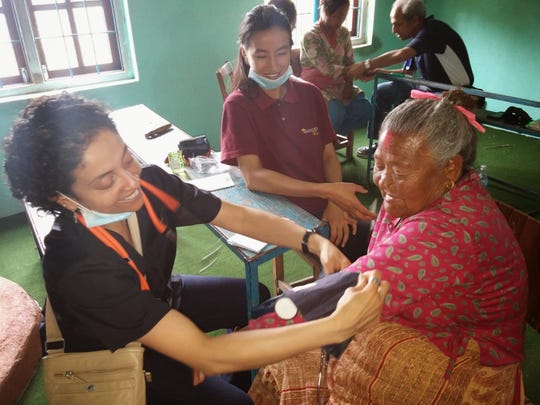
by blogadmin | Jul 5, 2019 | Blog Post, Delaware, Media Publishing's, Year 2019
“What do you think of doctors?” I have been asked.
“A heartless tribe of professionals experienced in focusing on your wealth while pretending to care for your health,” has been my reply.
But one of the physicians here in Delaware changed my mind.
I have observed him closely for years. He and his wife are both internists in Wilmington and practice under Trinity Medical Associates.
His name is Vinod Kripalu, MD, but everyone calls him Vinny. She is Chetana Kripalu, MD, and everyone calls her that.
Vinny could be mistaken for a famine victim with his frail frame. But his meager physique is not the result of poor nutrition, just a seemingly inexhaustible energy. An avid runner, last December he kept going for over 26 hours until the 100-mile mark finally stopped him.
The Kripalus’ devotion and dedication to helping and serving the needy, however, is unstoppable.
In 2006, Vinny organized his first visible philanthropic effort through a “Brick by Brick” fundraiser. The twelve thousand dollars it raised were used to build a school in Kenya. In 2008, he and Chetana provided their services on a medical mission to Jamaica.
He also established two nonprofit organizations he still serves — the Delaware Medical Relief Team (DMRT) and Premiere Charities Inc. (PCI).
The medical relief team was created in 2009 after an earthquake devastated Haiti.
“We were the first team to go within a few days of the earthquake. DMRT sent out seven teams after Haiti and five after the Nepal earthquake,” he told me.
Their service also helps those closer to home. Each Sunday, rain or shine, From Our Kitchen, a program of PCI, provides food to the homeless and needy at Front and Lombard in Wilmington. The organization feeds about 180 people in each service and has provided more than 80,000 meals since 2009.
PCI has raised more than half a million dollars over the years and contributed each cent to several relevant local and global causes such as the fund for families of deceased local firefighters, help for families affected by diseases such as breast cancer, and aid for victims of a Pakistan earthquake.
I was among those who attended PCI’s fundraiser gala in April at The Waterfall banquet hall in Claymont. I watched in amazement and admiration as Vinny’s father, 93-year-old father, Thirumalachar Kripalu, danced with his daughter-in-law, Chetana.
Curious about the Kripalus’ impulse to help, I reached out to Thirumalachar to trace his son’s roots.
“I had a very tough childhood,” said Kripalu, a retired Indian army brigadier. “We were extremely poor, had nothing. Existence was becoming tough. As a kid, I started begging to earn something and would give it to my mom. This habit of sharing with others became a satisfying habit.”
Kripalu continued: “I was a major posted in the UK when Vinny was born there in 1964. I cannot say whether I influenced him, but one thing is certain: Chetana has a lot to do with his giving. She wanted to serve the needy even more.”
In August of 2015, Chetana and her daughter, Meera, along with Meera’s friend, Hannah, and a nurse traveled to Nicaragua to establish a health clinic.
“Chetana was the only doctor and worked long hours daily at the clinic in Pantanal, one of the poorest barrios in Nicaragua,” according to Chuck Selvaggio, executive director of Neighbors to Nicaragua, a Wilmington nonprofit. Meanwhile, Meera and Hannah volunteered at a nearby school, working with and feeding the children.
“Both Chetana and Vinny have been very supportive of our work, contributing time, financial support (paying for many of the medications given out at the clinic), and, most of all, encouragement and inspiration by example in the great work they do and the wonderful people they are,” Selvaggio said “Their lives are nothing less than a great gift to our community and all the people they serve worldwide.”
It takes a long time, lots of fortitude and some luck to succeed in doing good. Not many doctors like Vinny and Chetana envision “state of complete wellbeing” for their patients by “nurturing their body, mind, and spirit.”
It is fitting that their work reflects the meaning of their Indian names. In the case of Vinny and Chetana, their first names mean happiness (Vinod) and consciousness (Chetana). Kripalu means indulgent.
Maybe that’s why they are happily and consciously indulgent!
– – – – – – –
This column was published online by the www.delawareonline.com on July 03, 2019.
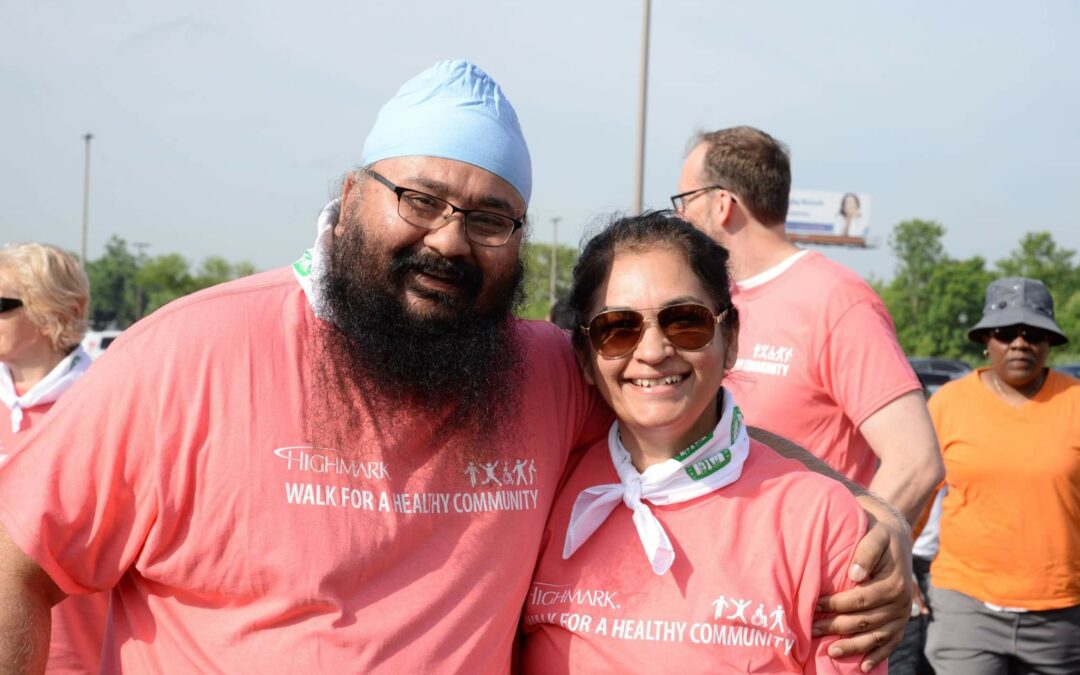
by blogadmin | Jun 13, 2019 | Delaware, Year 2019
Last Saturday, June 8th, introduced itself with a beautiful morning. Walkers and volunteers gathered in Wilmington’s Dawn Frawley stadium sported wide and warm smiles. Maybe they knew the joy ahead in walking the new scenic trail. For Renu and I, it was our first experience participating in Highmark Community Walk. I am glad we did it!

by blogadmin | Jun 4, 2019 | Delaware, Year 2019
Eid Mubarak everyone!
The recent Ramadan month was great not only because of the five interfaith Iftars I attended—including the one I hosted—and my apparent love for food. Also, because it gives people of other faith traditions a platform, an opportunity, to know Islam and the Muslims, dispelling in the process misunderstandings surrounding both.
What happens as a result is that non-Muslims like these two become admirers of the faith and its followers.
First, Kunwar Mohinder Singh Bedi “Sahar” (a descendant of Guru Nanak’s family), an eminent Urdu poet, famous for many ghazals (aaye hain samjhane log), said this about Islam:
Ishq ho jaye kisi se koi chara to nahi
Sirf Muslim ka Mohammed pe izara to nahi
(When you fall in love with someone what can you do
Only Muslim doesn’t have exclusivity over Mohammed)
Who needs introduction to Khushwant Singh. He was a man of many turbans: humorist, writer, journalist, satirist, syndicated columnist for 40 years, and lover of wine and women. However, he was equally renowned for his love of Pakistanis. He met none without appointment but Pakistanis.
Celebrate Eid
Celebrate Peace
Celebrate Fellowship








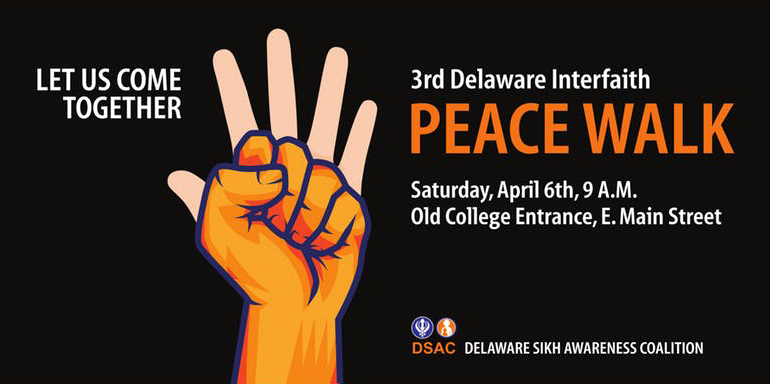
Recent Comments